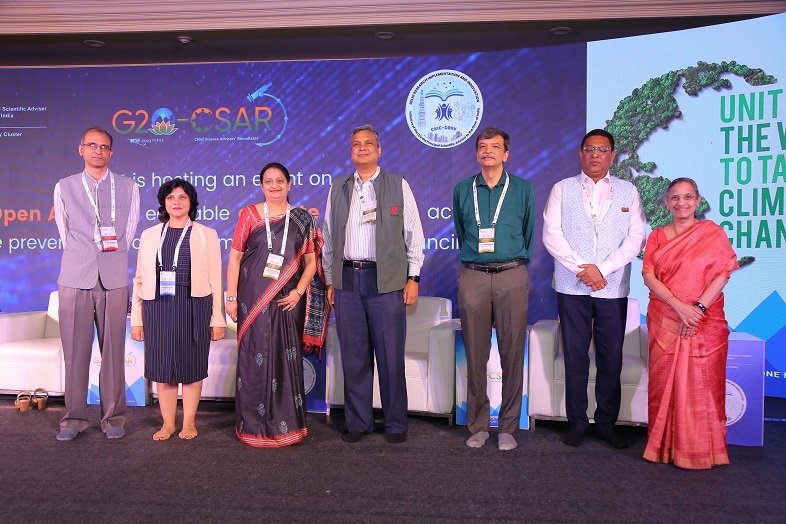
New Delhi, India- August 10th, 2023: Delhi Research Implementation and Innovation (DRIIV), an S&T cluster of the Office of the Principal Scientific Adviser to the Government of India, successfully hosted a momentous conference on ‘Role of Open Access in Equitable Climate and Health Action: Prevention, Response, and Financing’ under the esteemed aegis of G20-CSAR.
Climate change’s far-reaching consequences on health are widely acknowledged, ranging from disrupted weather patterns such as heat waves, floods, and cyclones to the surge of vector-borne diseases and antimicrobial resistance. This event, organised under the esteemed aegis of G20 CSAR, underscores the vital role that open access to data, research, and resources play in shaping equitable solutions to these challenges.
The conference, aimed to bridge critical gaps in climate-health research, foster cross-border cooperation and discuss strategies for resilient health systems. The inaugural session also saw the launch of the DRIIV Handbook. Dr. (Mrs.) Parvinder Maini, Hon’ble Scientific Secretary, Office of the Principal Scientific Adviser to the Government of India, delivered a keynote address that illuminated the conference’s core objectives and underscored the necessity for collective action.
Dr. (Mrs.) Parvinder Maini said, “The changing weather patterns testify to the reality of climate change, impacting global food security, water security, and human health. Climate change leads to vector-borne diseases, antimicrobial resistance, and zoonotic disease risks, affecting food production, nutrition, access to water, housing, education, and care. Science, Technology, and Innovation must be integrated to address these challenges together as stakeholders, including industry, academia, government, and local bodies. DRIIV, part of the 6 S&T clusters established, plays a major role in addressing climate change and health with initiatives in renewable energy, waste management, air pollution mitigation, healthcare, sustainable mobility, and education”.
“It’s time to acknowledge the irreversible impact of climate change and take action to slow its effects. Responding to climate change requires both mitigating its impact through greener technologies and reducing emissions and adapting to its ongoing effects. Global efforts like G20 CSR’s focus on disease control, expanding scientific knowledge access, diversity, equity, and inclusive science advice are crucial. Collaborative action and knowledge sharing across borders will help us solve global challenges. We anticipate fruitful discussions with dignitaries, embassies, and entities to strengthen cross-border collaboration for climate and public health”, she further added
Dr Vinod Kumar Paul, Hon’ble Member of NITI Aayog, while delivering a powerful keynote on the need for an inter-sectoral collaborative approach across government bodies to tackle public health-related problems caused by environmental pollution and climate change, said “Climate change and health challenges are intricately connected, as global warming leads to significant shifts like heat events, flooding, excess rain, and more, with direct and indirect health consequences. Zoonosis may increase as diseases and pathogens spill over from animals to humans, and waterborne diseases can surge due to calamitous weather patterns. Heat-related injuries become more prevalent, and new pathogens may emerge in geographies where they were previously absent. Melting ice poses the risk of releasing ancient pathogens. Health facilities will also face stress in such situations, necessitating a resilient health system. Additionally, the health system itself contributes significantly to global warming, with 5% attributed to hospitals and medical equipment’s energy consumption. As a nation, being prepared to address these challenges and demonstrate leadership is crucial, drawing from lessons learned during COVID control. Inter-sectoral collaboration is essential in tackling climate and health issues effectively.”
Ms Shipra Misra, CEO of DRIIV expressed “Such high profile participation from industry, academia, government bodies, embassies and international funding agencies in today’s event is a testimony to the impactful ecosystem that DRIIV has created. We look forward to working together with all constituencies to solve environmental and public health challenges, leveraging S&T solutions. Our commitment to working together for a common cause is reflected in the collective impact of six S&T clusters at a national scale”.
The well curated conference saw participation from international funding agencies such as the World Bank, Gates Foundation and Rockefeller Foundation; embassies such as the British High Commission and embassies of Sweden and Switzerland and Government bodies such as the PSA Office, Ministry of Health and Delhi Pollution Control Committee. Delegates also included CEOs of large corporates and senior leadership of premiere research institutes such as IIT D and AIIMS.